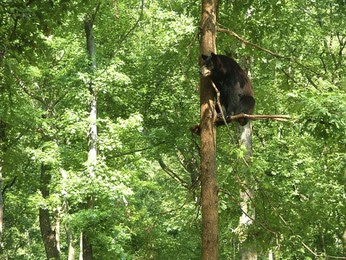
While it might not be your first choice as a snack, human-generated garbage is irresistible to a black bear.
The presence of unsecured household garbage (or other bear attractant) encourages bears to change their normal behavior and movement patterns and “hang out” in residential areas, according to the Georgia Department of Natural Resources’ Wildlife Resources Division (WRD).
“Be BearWise and know that one of the six BearWise Basics is about securing food, garbage, and recycling in order to avoid potential problems with bears,” says Adam Hammond, WRD state bear biologist. “When bears have access to human-provided foods, regardless of the source or the intent, they will take advantage of them, and that often leads to further problems.”
Why is it such a big deal? A bear that repeatedly finds food from garbage cans, bird feeders, and pet food bowls is unlikely to leave, and will become bolder in its search for easy food. This can lead to property damage of homes, garages, vehicles and more. Once bears have learned bad habits and have come to rely on people for a “free meal,” they rarely change those behaviors, and this type of behavior progressively gets worse with time and experience. If you really care about bears, please make the extra effort to ensure that your home and yard are “unattractive” to bears – to protect yourself, your family pets, and bears.
BearWise is an education program developed by bear biologists from each of the 15 state wildlife agencies that make up the Southeastern Association of Fish and Wildlife Agencies (SEAFWA). The program, anchored by the website www.bearwise.org, offers specific, detailed, and high-quality information to help people live responsibly with bears and to keep bears wild.
The black bear is a symbol of Georgia’s natural diversity, the only bear found in the state and a conservation success story. Though now considered the most common bear in North America, the species was nearly eradicated from Georgia in the 1930s due to unregulated hunting, illegal harvest – including the killing of bears as “vermin,” and large-scale habitat loss. Sound wildlife management practices have restored Georgia’s black bears to a thriving population estimated at 4,100 bears statewide.
Black bears may legally be taken during the hunting season, which occurs each fall in Georgia (https://georgiawildlife.com/hunting/hunter-resources). However, the taking of bears during any other time of the year, or the taking of bears illegally during the hunting season is called poaching. Prevent poaching of bears (by email, phone or in person) by reporting any illegal activity. Visit http://gadnrle.org/ranger-hotline for more information.
For more information on living responsibly with bears, visit www.bearwise.org.


Bulloch Public Safety
06/04/2025 Booking Report for Bulloch County

Bulloch Public Safety
05/27/2025 Booking Report for Bulloch County

Bulloch Public Safety
06/02/2025 Booking Report for Bulloch County

Bulloch Public Safety
05/19/2025 Booking Report for Bulloch County

Bulloch Public Safety
05/12/2025 Booking Report for Bulloch County

Bulloch Public Safety
05/16/2025 Booking Report for Bulloch County









